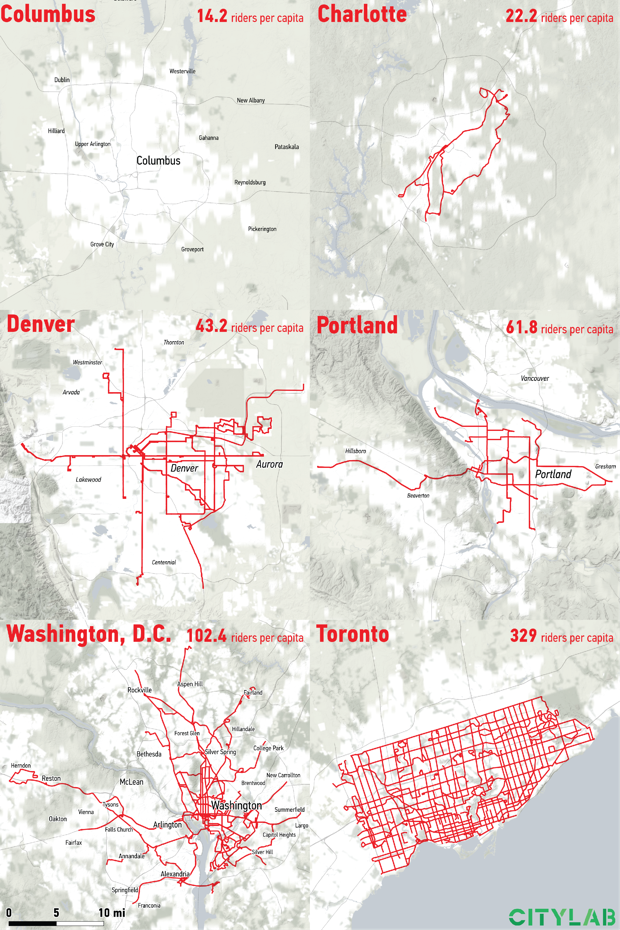From CITYLAB:
How America Killed Transit
JONATHAN ENGLISH 11:38 AM ET
Streetcar, bus, and metro systems have been ignoring one lesson for 100 years: Service drives demand.
One hundred years ago, the United States had a public transportation system that was the envy of the world. Today, outside a few major urban centers, it is barely on life support. Even in New York City, subway ridership is well below its 1946 peak. Annual per capita transit trips in the U.S. plummeted from 115.8 in 1950 to 36.1 in 1970, where they have roughly remained since, even as population has grown.
This has not happened in much of the rest of the world. While a decline in transit use in the face of fierce competition from the private automobile throughout the 20th century was inevitable, near-total collapse was not. At the turn of the 20th century, when transit companies’ only competition were the legs of a person or a horse, they worked reasonably well, even if they faced challenges. Once cars arrived, nearly every U.S. transit agency slashed service to cut costs, instead of improving service to stay competitive. This drove even more riders away, producing a vicious cycle that led to the point where today, few Americans with a viable alternative ride buses or trains.
Now, when the federal government steps in to provide funding, it is limited to big capital projects. (Under the Trump administration, even those funds are in question.) Operations—the actual running of buses and trains frequently enough to appeal to people with an alternative—are perpetually starved for cash. Even transit advocates have internalized the idea that transit cannot be successful outside the highest-density urban centers.
And it very rarely is. Below is a set of maps that show the present-day network rail and bus lines operating at least every 30 minutes, all day to midnight, seven days a week, for five urban areas in the U.S. and one in Canada for comparison. That could be considered the bare-minimum service level required for people to be able to live adequately car free. In fact, research says that frequencies of 15 minutes or better—good enough for people to turn up and go without consulting a schedule—are where the biggest jumps in ridership happen. But that is so far off from service levels in most American cities that a 30-minute standard is more appropriate.
 From top left corner: Columbus, Ohio, does not have a single route that meets the full service standard. In Charlotte, North Carolina, the the newly extended Lynx LRT helps a little. Denver, Colorado is adding light rail and commuter rail, but many still struggle to get to the rail station without a car. So do people in Portland, Oregon, despite its large light rail network and forward-thinking transit culture. Washington, D.C.’s Metro is one of the most well-used U.S. rapid transit systems, but connecting bus service is limited. It’s Toronto, Canada, that shows what properly high level of transit service looks like in North America. (Design: Jonathan English/Michael Binetti/David Montgomery/CityLab. Ridership data: American Public Transportation Association/Toronto Transit Commission. Map tiles: Stamen Design, under CC BY 3.0. Data by OpenStreetMap, under ODbL.)
From top left corner: Columbus, Ohio, does not have a single route that meets the full service standard. In Charlotte, North Carolina, the the newly extended Lynx LRT helps a little. Denver, Colorado is adding light rail and commuter rail, but many still struggle to get to the rail station without a car. So do people in Portland, Oregon, despite its large light rail network and forward-thinking transit culture. Washington, D.C.’s Metro is one of the most well-used U.S. rapid transit systems, but connecting bus service is limited. It’s Toronto, Canada, that shows what properly high level of transit service looks like in North America. (Design: Jonathan English/Michael Binetti/David Montgomery/CityLab. Ridership data: American Public Transportation Association/Toronto Transit Commission. Map tiles: Stamen Design, under CC BY 3.0. Data by OpenStreetMap, under ODbL.)
The maps illustrate the vast swaths of urban areas untouched by full service bus routes. For those who do live near one, it’s quite likely that the bus wouldn’t get them where they need to go, unless their destination is downtown. A bus that comes once and hour, stops at 7 pm, and doesn’t run on Sundays—a typical service level in many American cities—restricts people’s lives so much that anyone who can drive, will drive. That keeps ridership per capita low.
What happened? Over the past hundred years the clearest cause is this: Transit providers in the U.S. have continually cut basic local service in a vain effort to improve their finances. But they only succeeded in driving riders and revenue away. When the transit service that cities provide is not attractive, the demand from passengers that might “justify” its improvement will never materialize.
Here’s how this has played out, era by era.
[...]
Link:
How America Killed Transit



